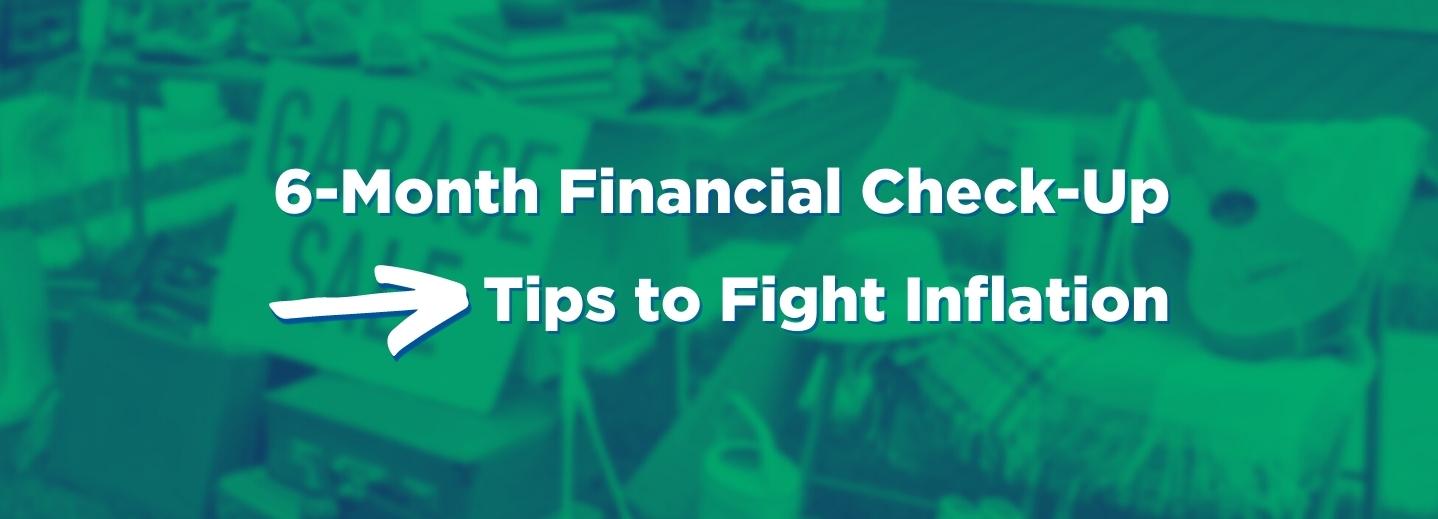6-Month Financial Check-Up: Tips to Fight Inflation

Creating and maintaining a budget is one of the best ways to achieve your financial goals. However, even the most dedicated consumers can find it challenging at times. That’s why it’s essential to revisit your budget and financial plan every six months. This financial check-up is your opportunity to get back on track before you stray too far from your goals.
The six-month financial check-up is even more crucial today as inflation continues to decrease the value of your money. With less money to spend, it’s important to find ways to maximize your hard-earned dollars.
Check out these inflation-fighting strategies when performing your financial review.
Keep on Saving
It’s hard to save money or keep your saving at your current level when your spending power is declining due to inflation. As prices rise, your same expenses require more of your money. While you should aim to keep saving money each month, if it’s difficult, try decreasing the amount you save temporarily. If you save 15% of your take-home pay monthly, drop it to 12% or even 10%. Only reduce what is necessary and try to make the reduction short-term, if possible.
Adjust Your Budget
When you’re spending more and saving less due to inflation, you may need to adjust your budget. Look for obvious areas to cut back, such as entertainment and dining out. Then try to uncover other savings opportunities. While many companies are raising prices, others realize their customers are struggling and are offering discounts and lower-tier options.
Get a Better Credit Card
Most credit cards today have variable interest rates. This means the interest rate will fluctuate with the economy. As the Federal Reserve continues to raise rates to fight inflation, credit cardholders are noticing their interest rates jumping as well.
Fighting inflation as a consumer means making the most of every dollar. That includes decreasing the amount you pay in interest on credit cards. If your interest rates were already high on credit cards, they’re even higher now. Most rewards cards carry higher interest rates. Instead, focus on finding a lower-rate credit card – especially if you cannot repay the balance in full each month.
Maximize Your Grocery Budget
With prices rising on just about everything on the shelves, finding ways to make your grocery funds go further is essential. Review these tips before your next trip to the grocery store:
- Consider generic food brands and medication.
- Prevent overspending by making a list before you shop.
- Leave the kids at home.
- Buy in bulk to cut down on per unit or use costs.
- Use grocery store apps, like Walmart Pickup. It’s helpful to see your total as you add items to your cart. This strategy makes sticking to a budget much easier and allows you to identify items that eat into your budget.
Sell to Buy
Make it a habit of selling unused or old items before you buy new ones. Find old clothes you or the kids never wear or are too small – and sell them online or at local consignment shops. Then use those funds to buy new items.
You can do the same with kids’ toys. That is, sell an old toy before buying a new one. Check out Facebook Marketplace and Craigslist to sell used items online. You may even consider buying used items yourself if you want to make your budget go even further.
Prepare for the Holidays
While the holidays are still a ways off, they’ll be here before you know it. Unfortunately, rising prices will only make the season more stressful. The best way to save money and reduce holiday spending is to plan now.
Prices tend to rise before the holidays in general - then stores offer discounts to boost sales. With prices already jumping, it’s wise to begin your shopping now. If you typically travel over the holidays, purchase tickets earlier this year to lock in better prices. Any preparations you can make now to save money will help keep the holidays merry.
CAMPUS Can Help!
Everyone feels the effects of inflation. Adjusting your budget and finding ways to maximize your hard-earned dollars are essential. That may include locking in a lower-rate credit card, refinancing loans at lower interest rates, consolidating debt, or opening a holiday savings account.
If you’re performing a six-month financial check-up and are interested in these services or have questions, we’re here to help. Please stop by any of our convenient service center locations or call 800-367-6440 today.
Other Resources
Refinance Your Auto Loan: Is It Right For You?
How Debt Consolidation Loans Work and the Benefits
Budgeting Basics On-Demand Webinar (includes a printable budget spreadsheet)
By CAMPUS USA